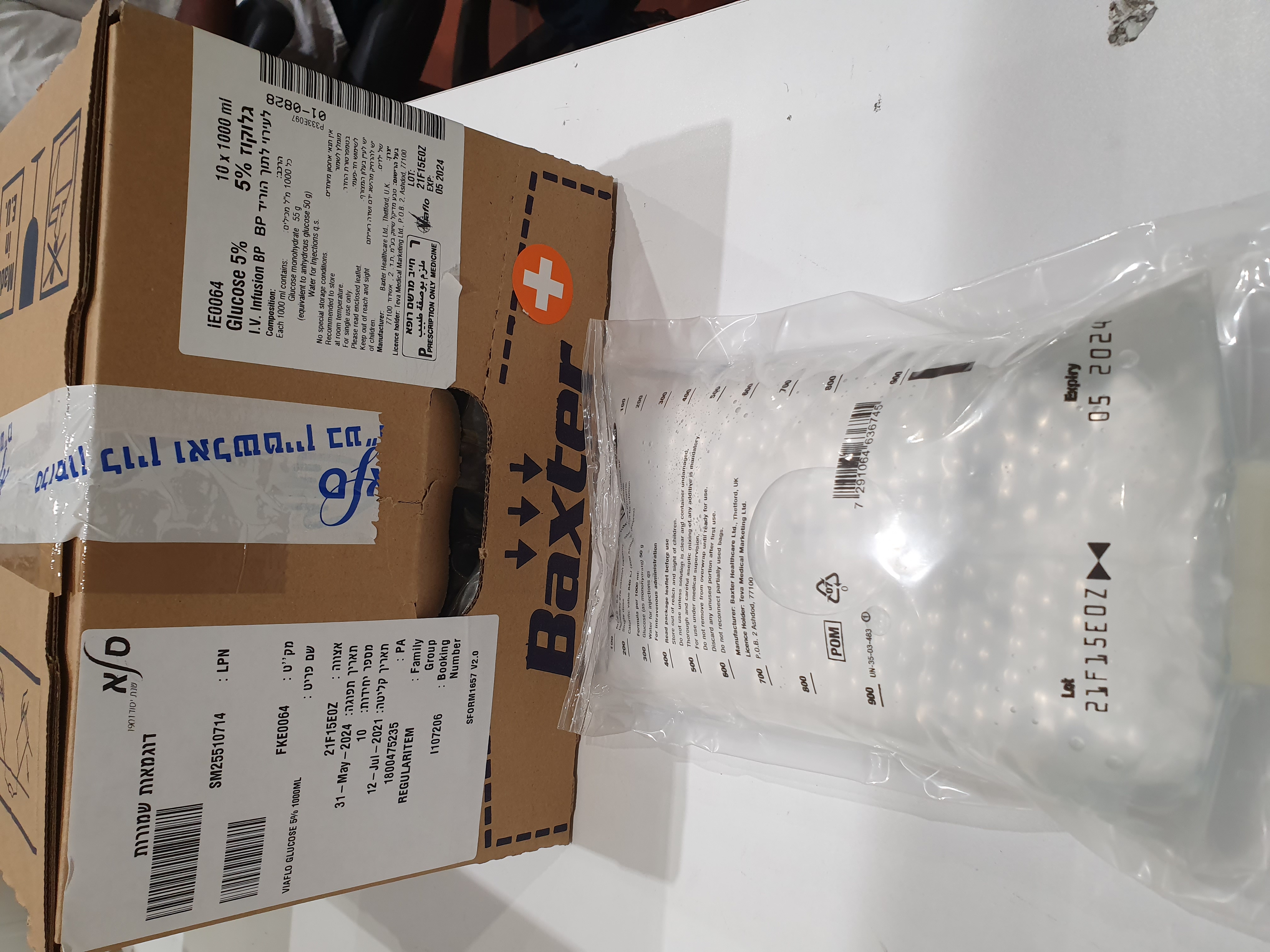Quest for the right Drug

גלוקוז % 5 לעירוי לתוך הוריד BP GLUCOSE 5 % INTRAVENOUS INFUSION BP (GLUCOSE MONOHYDRATE)
תרופה במרשם
תרופה בסל
נרקוטיקה
ציטוטוקסיקה
צורת מתן:
תוך-ורידי : I.V
צורת מינון:
תמיסה לאינפוזיה : SOLUTION FOR INFUSION
עלון לרופא
מינוניםPosology התוויות
Indications תופעות לוואי
Adverse reactions התוויות נגד
Contraindications אינטראקציות
Interactions מינון יתר
Overdose הריון/הנקה
Pregnancy & Lactation אוכלוסיות מיוחדות
Special populations תכונות פרמקולוגיות
Pharmacological properties מידע רוקחי
Pharmaceutical particulars אזהרת שימוש
Special Warning עלון לרופא
Physicians Leaflet
Posology : מינונים
4.2. Posology and method of administration Posology Adults, the Elderly and Children : The concentration and dosage of Glucose 5% Intravenous Infusion is determined by several factors including the age, weight, and clinical condition of the patient. Serum-glucose concentrations may need to be carefully monitored. The recommended dosage for treatment of carbohydrate and fluid depletion is: - for adults : 500 ml to 3 litres/24h - for babies and children : - 0-10 kg body weight: 100 ml/kg/24 h. - 10-20 kg body weight: 1000 ml + 50 ml/kg over 10 kg/24 h. - > 20 kg body weight : 1500 ml + 20 ml/kg over 20 kg/24 h. The infusion rate depends on the patient's clinical condition. Infusion rate should not exceed the patient’s glucose oxidation capacities in order to avoid hyperglycaemia. Therefore, the maximum dose ranges from 5mg/kg/min for adults to 10-18 mg/kg/min for babies and children depending on the age and the total body mass. The recommended dosage when used as a vehicle or diluent ranges from 50 to 250 ml per dose of medicinal product to be administered. When Glucose 5% is used as a diluent for injectable preparations of other drugs, the dosage and the infusion rate will be principally dictated by the nature and the dose regimen of the prescribed drug. Paediatric population The infusion rate and volume depends on the age, weight, clinical and metabolic conditions of the patient, concomitant therapy and should be determined by the consulting physician experienced in paediatric intravenous fluid therapy. Method of Administration: The solution is for administration by intravenous infusion (peripheral or central vein). When the solution is used for dilution and delivery of therapeutic additives for administration by intravenous infusion, the direction for use with additive therapeutic substances will dictate the appropriate volumes for each therapy. Glucose 5% intravenous infusion is an isosmotic solution. Please see section 3 for the information about the osmolarity of the solution. Precautions to be taken before handling or administering the medicinal product Parenteral drug products should be inspected visually for particulate matter and discoloration prior to administration, whenever solution and container permit. Use only if the solution is clear, without visible particles and the container is undamaged. Administer immediately following the insertion of infusion set. The solution should be administered with sterile equipment using aseptic technique. The equipment should be primed with the solution in order to prevent air entering the system. Electrolyte supplementation may be indicated according to the clinical needs of the patient. Additives may be introduced before or during infusion through the injection site. When introducing additives, the final osmolarity of solutions need to be checked. Administration of hyperosmolar solutions may cause venous irritation and phlebitis. Thorough and careful aseptic mixing of any additive is mandatory. Solutions containing additives should be used immediately and not stored. Please see section 4.4 for the risk of air embolism.

שימוש לפי פנקס קופ''ח כללית 1994
לא צוין
תאריך הכללה מקורי בסל
01/01/1995
הגבלות
תרופה מוגבלת לשימוש בבתי חולים או אשפוז יום
מידע נוסף
